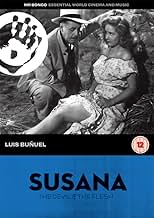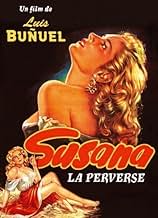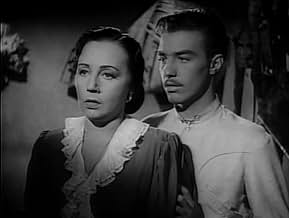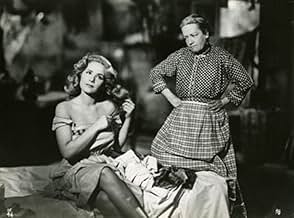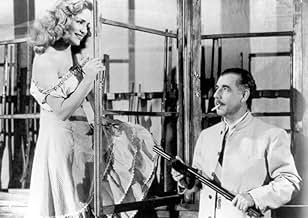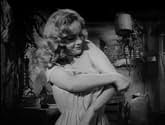VALUTAZIONE IMDb
7,2/10
2401
LA TUA VALUTAZIONE
Una giovane donna fugge dal riformatorio e rimane nella casa di una famiglia ricca e rispettabile. A poco a poco, provoca discordie tra i membri della famiglia fino a quando non torna in car... Leggi tuttoUna giovane donna fugge dal riformatorio e rimane nella casa di una famiglia ricca e rispettabile. A poco a poco, provoca discordie tra i membri della famiglia fino a quando non torna in carcere.Una giovane donna fugge dal riformatorio e rimane nella casa di una famiglia ricca e rispettabile. A poco a poco, provoca discordie tra i membri della famiglia fino a quando non torna in carcere.
- Regia
- Sceneggiatura
- Star
- Premi
- 1 candidatura in totale
Jesús García
- Empleado de Guadalupe
- (non citato nei titoli originali)
Leonor Gómez
- Empleada de Guadalupe
- (non citato nei titoli originali)
Recensioni in evidenza
Even as a "minor" work, I was a little surprised to find out that Luis Bunuel didn't care very much for the experience or final product of Susana (aka Devil in the Flesh). It is, I'll admit, not something I would rush out to tell my fellow Bunuel friends to see; part of that is practical, since it's only available on a VHS from the mid-80s and isn't in great condition even if found, but the other part is that it takes a real fan to appreciate it as a Bunuel film. Like Robinson Crusoe to an extent, though I think here more-so, it relies a bit for the audience member to understand what it is that attracted the great surrealist to the project. Temptation, pure and simple: this is at its best a story that allowed for the filmmaker to bask in a long-favored pastime, which was ticking off the uptight religious fanatics and purists who couldn't stand to see any kind of sensuality on the screen.
Sure, it definitely pales in comparison to the desire and temptation on parade and blasting at 11 in Un Chien Andalou or Viridiana. That's because Bunuel is keeping it on the down-low, which has its advantages and sort of disadvantages. On its own Susana is simply a melodrama, a story of this girl Susana (beautiful and talented if two-note Rosita Quintana) who escapes in one of those fun Bunuelian twists from a mental asylum to wind up on a rainy night in the care of a pretty religious farmhouse. She fits in with the chores and such, but also does her best to tempt the prudish on the farm (when she's asked to cover up she does, until no one's looking relatively), but winds up in a real pickle when tempting the wrong man.
And, on its own terms, it's a pretty decent melodrama. Some good performances, a few very good scenes of dialog and tension, but also on the scale of a very good soap opera all the same. I can see where Bunuel might have had some tension during the making; it feels and is a studio production, and as such he had to stay well within the limitations of the subject matter and low-budget. But it is worth seeing because it is still a Bunuel picture, with moments like that scene at night where the two men look on, tongues practically dangling out of their mouths, watching as Susana simply brushes her hair in silhouette, or a few moments where the twisted humor ratchets up a notch or too (it's rare, but worth it, if only in the unintended or just dated "scandalous" nature of the content). It's safe stuff coming from the director of the Phantom of Liberty, but it's not at all a bad movie either.
Sure, it definitely pales in comparison to the desire and temptation on parade and blasting at 11 in Un Chien Andalou or Viridiana. That's because Bunuel is keeping it on the down-low, which has its advantages and sort of disadvantages. On its own Susana is simply a melodrama, a story of this girl Susana (beautiful and talented if two-note Rosita Quintana) who escapes in one of those fun Bunuelian twists from a mental asylum to wind up on a rainy night in the care of a pretty religious farmhouse. She fits in with the chores and such, but also does her best to tempt the prudish on the farm (when she's asked to cover up she does, until no one's looking relatively), but winds up in a real pickle when tempting the wrong man.
And, on its own terms, it's a pretty decent melodrama. Some good performances, a few very good scenes of dialog and tension, but also on the scale of a very good soap opera all the same. I can see where Bunuel might have had some tension during the making; it feels and is a studio production, and as such he had to stay well within the limitations of the subject matter and low-budget. But it is worth seeing because it is still a Bunuel picture, with moments like that scene at night where the two men look on, tongues practically dangling out of their mouths, watching as Susana simply brushes her hair in silhouette, or a few moments where the twisted humor ratchets up a notch or too (it's rare, but worth it, if only in the unintended or just dated "scandalous" nature of the content). It's safe stuff coming from the director of the Phantom of Liberty, but it's not at all a bad movie either.
In a stormy night, the sexy Susana (Rosita Quintana) escapes from the reformatory and reaches the ranch of Don Guadalupe (Fernando Soler), a family man that lives with his wife Dona Carmen (Matilde Palou) and their beloved son Alberto (Luis López Somoza). When they see Susana, Dona Carmen, who is Christian and Good Samaritan, gives shelter to the youngster that lies to them, but the old maid Felisa (María Gentil Arcos) is not convinced that she is telling the truth. The seductive Susana uses her beauty and sensuality to seduce Don Guadalupe, Alberto and the henchman Jesus (Víctor Manuel Mendoza) and destabilizing the family.
"Susana" is a melodramatic film by Buñuel with a simple story of a sexy woman that uses her body to seduce man and gets what she wants. The conclusion is moralist and conventional, but the film is good and Rosita Quintana is perfect for the role of Susana. My vote is seven.
Title (Brazil): "Susana"
"Susana" is a melodramatic film by Buñuel with a simple story of a sexy woman that uses her body to seduce man and gets what she wants. The conclusion is moralist and conventional, but the film is good and Rosita Quintana is perfect for the role of Susana. My vote is seven.
Title (Brazil): "Susana"
Buñuel's fifth feature, a small-budgeted moral parable made in Mexico, almost exclusively confined in the hacienda of a middle-class rancher owner Don Guadalupe (Soler). In an unusual tempest night, a sultry young woman Susana (Quintana) escapes from a reformatory and winds up at his doorstep, she is taken in by the kind-hearted matriarch Doña Carmen (Palou), Guadalupe's wife, as a domestic help. But soon the seemingly perfect family will disintegrate from inside when Don Guadalupe, his adolescent son Alberto (Somoza) and the masculine ranch helper Jesús (Mendoza) are all attracted to Susana's sex appeal, only the God-fearing maid Felisa (Arcos) sees through her innocuous front, but who can save the family from the ultimate rupture in the climax? Only Buñuel's deus ex machina.
In fact, the movie itself is grounded on a surreal precondition, in the opening scenes, Susana is locked up in a solitary cell, she entreats God in front of a cross materialised by the shadows of the metal bars, to give her a way out since she can not change her nature, which is made by God himself, so God grants her wish, as if he wants to cast a prank on us, releases the snake into the Garden of Eden. The script runs formulaic-ally where three different types of men all become the victims of Susana's seduction, Rosita Quintana successful captures her carnal allure with crude histrionics, for the spunky Jesús, she is the unattainable wench who promises him something sweet but refuses his pushing courtship; for the bookish Alberto, she is a proactive seductress from whom he is too green to resist, and for the patrician Guadalupe, she becomes a damsel in distress, who inadvertently rekindles his sexual urge which a married middle-age man can no longer obtain from his wife. While men are succumbing to their primitive lust, after seeing through her veiled pretence, Carmen and Felisa strike up, only that would be too late if Buñuel had opted for a more sinister finale.
The happy ending is a policy of appeasement, even the mare miraculously regains its vitality, but the re-gained conformity and harmony appear so ironic thanks to Buñuel's poker-faced mockery - how simple a weed in the field can bring about moral corruption to a conventional middle-class family. SUSANA is a fetching microcosm of Buñuel's views on human frailties, unambitious, simple but integral and surprisingly gratifying.
In fact, the movie itself is grounded on a surreal precondition, in the opening scenes, Susana is locked up in a solitary cell, she entreats God in front of a cross materialised by the shadows of the metal bars, to give her a way out since she can not change her nature, which is made by God himself, so God grants her wish, as if he wants to cast a prank on us, releases the snake into the Garden of Eden. The script runs formulaic-ally where three different types of men all become the victims of Susana's seduction, Rosita Quintana successful captures her carnal allure with crude histrionics, for the spunky Jesús, she is the unattainable wench who promises him something sweet but refuses his pushing courtship; for the bookish Alberto, she is a proactive seductress from whom he is too green to resist, and for the patrician Guadalupe, she becomes a damsel in distress, who inadvertently rekindles his sexual urge which a married middle-age man can no longer obtain from his wife. While men are succumbing to their primitive lust, after seeing through her veiled pretence, Carmen and Felisa strike up, only that would be too late if Buñuel had opted for a more sinister finale.
The happy ending is a policy of appeasement, even the mare miraculously regains its vitality, but the re-gained conformity and harmony appear so ironic thanks to Buñuel's poker-faced mockery - how simple a weed in the field can bring about moral corruption to a conventional middle-class family. SUSANA is a fetching microcosm of Buñuel's views on human frailties, unambitious, simple but integral and surprisingly gratifying.
This Bunuel film is based on a story written by a certain Manuel Reachi (who incidentally, like the director Bunuel, was born in Spain and died in Mexico). The film indirectly (and in some ways directly) glorifies the pious Christian faithful--here personified by the lady of the house and her chief maid who can spot "the devil" before the others do and is ready to drive it out as Jesus did in the Bible. This is a definite departure for Bunuel, who has never really shown a true Christian point of view in his films (except in Nazarin) but only chose to ridicule often than respect it.
The film is also a major departure for actor Fernando Soler playing the role of the rich landowner who gives a tepid performance compared to the one he gave in the other Bunuel film "The Great Madcap" (1949) made 2 years before this film.
The film is also a major departure for actor Fernando Soler playing the role of the rich landowner who gives a tepid performance compared to the one he gave in the other Bunuel film "The Great Madcap" (1949) made 2 years before this film.
This film, judging by some of the reviews on this page, seems to have a provocative effect: one person seems to feel that Susana is evil incarnate and should have been killed. Perhaps that's the point: Bunuel may very well have meant her to be a caricature of the "bad girl." While she uses her sexuality as a weapon, she is merely provoking desires that were always there. The family she inserts herself into is an apparently happy one, and perhaps itself a stereotype, with feelings under the surface waiting to escape, just as Susana herself is an escapee. Her seduction technique is itself pointedly obvious, and Bunuel may very well have been telling something of a joke with this film, neither his best nor worst. And the actress who plays Susana does have nice shoulders.
Lo sapevi?
I più visti
Accedi per valutare e creare un elenco di titoli salvati per ottenere consigli personalizzati
- How long is Susana?Powered by Alexa
Dettagli
- Data di uscita
- Paese di origine
- Sito ufficiale
- Lingua
- Celebre anche come
- Susana
- Luoghi delle riprese
- Aziende produttrici
- Vedi altri crediti dell’azienda su IMDbPro
- Tempo di esecuzione
- 1h 26min(86 min)
- Colore
- Proporzioni
- 1.37 : 1
Contribuisci a questa pagina
Suggerisci una modifica o aggiungi i contenuti mancanti

